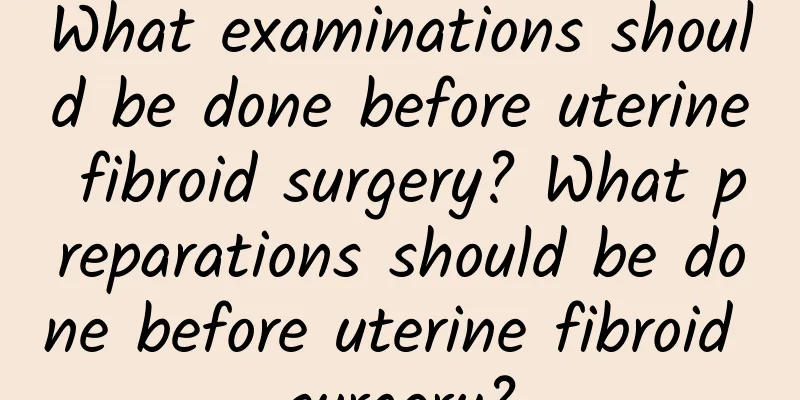What examinations should be done before uterine fibroid surgery? What preparations should be done before uterine fibroid surgery?

|
Uterine fibroids are the most common tumors of the female genitals. They can cause female infertility, miscarriage, frequent urination, urination disorders and other hazards, and are the main killer of women's health. So, what are the examinations before uterine fibroid surgery? Diagnostic curettage is the most commonly used, simple and easy auxiliary diagnostic method in gynecology. Its basic requirements are to explore and understand the situation of the uterine cavity and scrape the endometrium for pathological testing. During diagnostic curettage, the depth, direction, deformation and submucosal fibroids of the uterine cavity are checked, and vaginal examination is assisted to determine the location of uterine fibroids and their impact on the uterine cavity. The following are five examinations before uterine fibroid surgery: 1. Ultrasound examination: B-ultrasound examination is a common method for diagnosing uterine fibroids, and the accuracy of fibroid identification can reach 93.1%. Ultrasound examination shows that the uterus is enlarged and irregular in shape; the number, location, size of fibroids, whether the fibroids are uniform or liquefied cysts; and whether there is compression of other organs around. 2. Uterine probe examination: Use a probe to measure the uterine cavity. Intramural fibroids or submucosal fibroids often enlarge and deform the uterine cavity. The uterine probe can be used to detect the size and direction of the uterine cavity. Compared with the double clinic, it helps to determine the nature of the mass and understand whether there is a mass in the cavity and its location. 3. Plain X-ray examination: When the tumor is calcified, it appears as scattered uniform spots, or a shell-like calcified capsule, or a rough, wavy, honeycomb-like edge. 4. Diagnostic curettage: Small submucosal fibroids or dysfunctional uterine bleeding, endometrial polyps are not easy to be found through biphasic diagnosis, and can be assisted by curettage. If it is a submucosal fibroid, the scraper feels the uterine cavity bulge, starts high and then slides, or feels something sliding in the uterine cavity. However, small submucosal fibroids are easy to slide and missed, which is the shortcoming of diagnostic curettage. 5. Hysterosalpingography: Ideal hysterosalpingography can not only show the number and size of submucosal fibroids, but also locate them. Therefore, it is very helpful for the early diagnosis of submucosal fibroids, and the method is simple. Photography of the fibroid site shows that the uterine cavity is incomplete. |
<<: What to eat after uterine fibroid surgery? Dietary conditioning methods for uterine fibroids
Recommend
What are the signs of ovarian cysts?
Signs of ovarian cysts include a noticeable incre...
The manifestation of ovarian cyst symptoms determines whether you are healthy
The most effective way to prevent ovarian cysts i...
How to regulate irregular menstruation
How to regulate irregular menstruation? Irregular...
Taking emergency contraceptive pills, menstruation comes twice
Taking emergency contraceptive pills, menstruatio...
Does adenomyosis make menopause more likely?
Some women no longer pay attention to hygiene, wh...
What are clue cells?
Clue cells are special cells that can be seen und...
Does cervical erosion have a slight impact on pregnancy?
Does cervical erosion have a slight impact on pre...
What are the adverse effects of abortion on subsequent pregnancy?
According to research, a history of artificial ab...
Ectopic pregnancy may be caused by appendicitis perforation
Ectopic pregnancy may be caused by appendicitis p...
What to do with cervical erosion, 3 methods and 3 nursing care for clinical treatment of cervical erosion
Cervical erosion is one of the more common gyneco...
Non-invasive body sculpting is on the rise! Pediatric clinics are also rushing to do
Body sculpting, which claims to be non-invasive, ...
The myth of eating small and frequent meals! Eating more often will accelerate aging
It is generally believed that we should eat small...
What causes bacterial vaginosis
What causes bacterial vaginosis? Bacterial vagino...
Symptoms of uterine fibroids can cause women to have severe lower abdominal pain.
As we all know, the symptoms of uterine fibroids ...
Breastfeeding Breast Atrophy and Sagging Lymphatic Massage
Breast milk is nutritionally balanced and contain...









